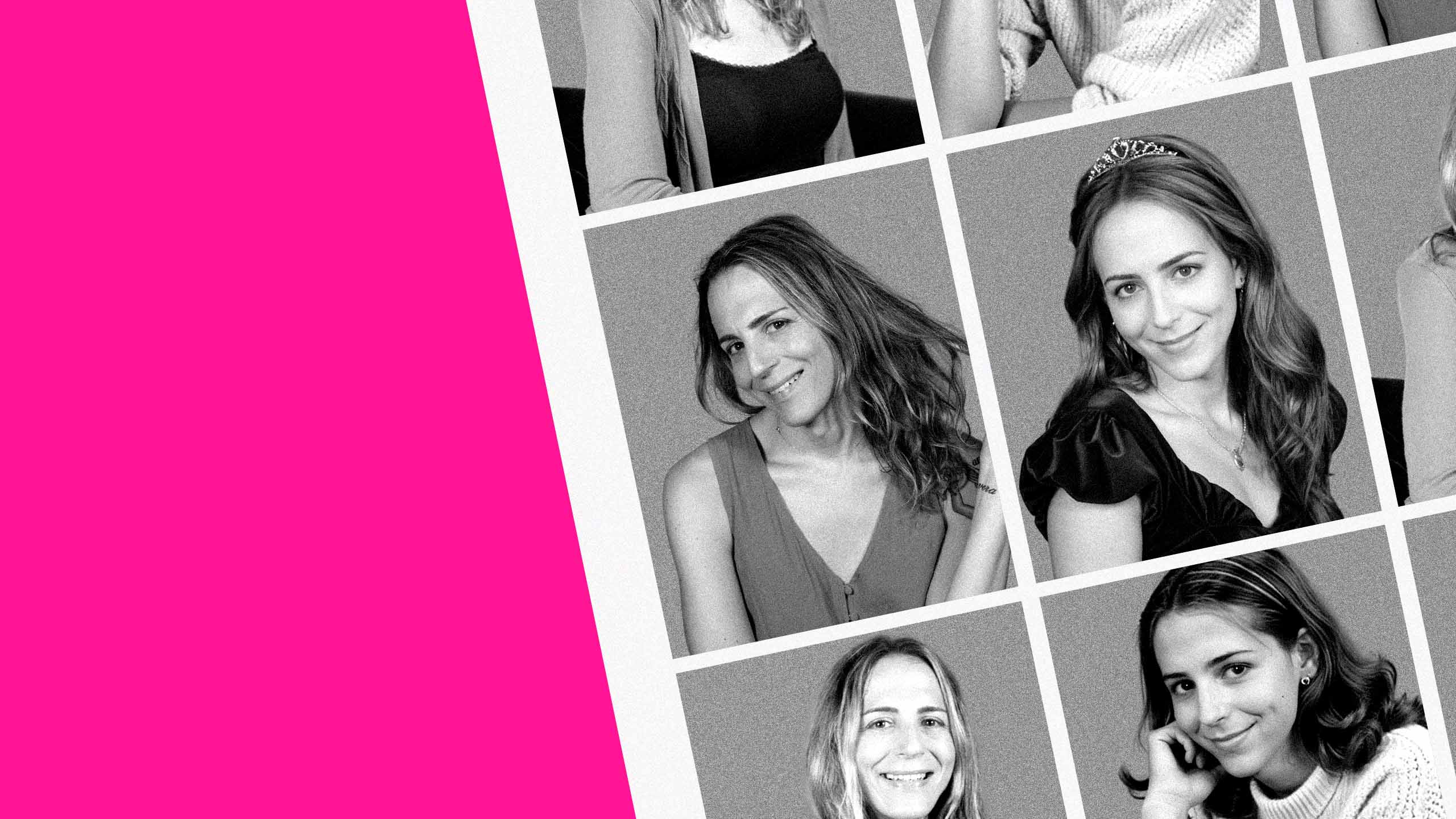Very recently, I began noticing a trend on Instagram: most of the trans women I follow were posting “high school yearbook photos” of themselves from an adolescence they never actually got to live. These photos were often accompanied by heartfelt statements about mourning stolen childhoods and thinking about what could have been if they had been brought up in a world where their transness had been accepted and celebrated, instead of stigmatized and repressed.
These women were participating in a recent viral trend—using the popular Epik AI app to create fake high school yearbook photos—but queering it to very particular ends. They were using it to try and help process a deep pain familiar to many trans and queer people.
As a woman who transitioned in adulthood, I understand this pain very well. A child of the ’80s—when the only trans people in sight were being ritually humiliated on daytime talk shows—it never occurred to me that I could have been like those people. I was way too repressed and self-hating for that. I never understood what the “T” in “LGBT” meant until I was in my mid-20s, and I stayed so deep in the closet for my whole childhood that I didn’t even realize there was a closet. The ’80s were an unreservedly awful time for trans people, where the gains that we had been making in the two previous decades—such as having some access to medical care and some visibility via celebrities like Renée Richards—were all reversed, and then some. I have spent countless hours grieving a girlhood that was lost to the intense social stigma against trans people during my youth, as well as to humiliation from my family and classmates, who met even my most incidental attempts at gender nonconformity with bullying and abuse. Instead of getting to come of age as a girl, I crossdressed in desperate, stolen moments that brought me equal amounts of relief and abject shame.
I have spent countless hours trying to process and make peace with the decades of childhood that have been stolen from me, but it is something that I doubt I can ever completely grieve, no matter how much I try to do so. It’s a pain that I have no choice but to carry around with me and do my best to accept.
“I’m usually not very big on social media trends like these, and I never use apps like Facetune or social media filters, because, to me, these things feel fake. But it was different with this app: I wanted to lean into the fantasy element of it.”
When I saw how these other women had been using the Epik app to think about their own stolen childhoods, it immediately caught my attention, and I wanted to try it for myself. I’m usually not very big on social media trends like these, and I never use apps like Facetune or social media filters, because, to me, these things feel fake. But it was different with this app: I wanted to lean into the fantasy element of it. I was intrigued by how it might let me have and hold something that had always seemed ephemeral and out of reach.
So, with trembling hands, I downloaded the Epik app and began uploading my 12 selfies, selecting the “female” option. (Epik allows users to choose “male,” “female” or “other,” but it’s unclear what exactly the last one refers to or what would happen if you chose it.) It was a nice bonus that the app aims to create ’90s-style yearbook photos, as that was actually when I did go to high school. Epik gives users two options, a 24-hour “normal” turnaround time, and a two-hour “express” feature; both are paid, with the express option unsurprisingly costing more. Strangely, when I uploaded my photos, the standard option was “sold out” and the express had been discounted from $9.99 to $5.99. It seemed like a small fee to potentially help heal an immense trauma.
Once I entered my credit card info, the wait began. To my surprise, the little time countdown started not at two hours but at 29 minutes. Once I saw the minutes ticking down, I was surprised by how real and high-stakes this felt for me. It really did seem like these photos might be able to give me back some actual piece of all those lost years. I was beginning to have expectations about what might happen, and so the whole enterprise now felt fraught with risk. What if I was disappointed? What if it just felt like a silly AI gimmick? What if this little glimpse of what might have been was actually so compelling that it turned out to be too much for me to bear?
Shon Faye is one of the many trans writers who have explored just what happens during our lost childhoods. Regarding the stigma that attaches itself throughout a trans childhood, she writes in her book The Transgender Issue: Trans Justice Is Justice for All that this stigma has “a profound impact on the child, who learns that a fundamental aspect of themselves and their psychological makeup is wrong, but still cannot be changed.” This is the double bind that I was in, being screamed at and shamed as a pervert by my family for my feminine ways, but also being completely powerless to change them. Faye also writes that queer adolescents are “forced to internalize a constant drip-feed of humiliation.” She further points out that a sizable body of research indicates that such childhood humiliation is “associated with a range of negative mental health outcomes later in life.” I can vouch for the years of work I’ve had to do in order to try and fix all of the damage done to my psyche by the unending drip of humiliation throughout my childhood.
Beyond these disastrous negatives is a feeling shared by many trans people that even the good parts of our childhood are invalid. Looking back, all the hours I spent trying to compensate my parents for my hated femininity by excelling at things like baseball (in which I had very little real interest) feel like a waste. I wish I’d been able to follow my true interests. I would have given anything to have grown my hair long as a teen, to have gotten to explore my own sense of fashion or to have learned to be a dancer. Likewise, the relationships I developed as a teenager were hopelessly wrong—I desperately wanted female friends, as I understood on some level that they were my real peers, but I was stuck trying to be one of the boys, and any attempts I made to connect with girls were taken incorrectly as signs of romantic interest. Unsurprisingly, my adolescent relationships were awkward, superficial and unfulfilling, and none of them lasted long past high school.
The years when I was coming out and transitioning felt, for me, like reliving my life at an extremely accelerated pace. As one generally does as a teen, I went through a number of distinct personal styles rapid-fire over the course of a few years. (One of the ways I know my transition must be over is that my style has been pretty stable for a while now.) I started over in my career, and did a lot of exploring to find a job that actually fit who I really was, finally settling on being a therapist, a job that I find so much more correct and fulfilling than what I used to do. There was also a lot of turmoil in my relationships, as I found that many no longer fit, and many were, in fact, low-quality relationships that I was just hanging on to because they seemed like all that was possible. As I began to express my true self in my mid-30s, I learned to master relationship skills that I should have built in my 20s, and figured out how to surround myself with people who were actually good for me.
It has felt so pointlessly cruel to me, and like such a waste of human potential, that I have had to live my life this way instead of just getting to do all this stuff at the proper time and in the proper order. This is one reason why I fight so hard for the rights of trans children, which are currently being snatched away at a frightening pace. Cis adults who say such things like “your brain isn’t fully developed until you’re 25” or “you can’t get a tattoo, so why should you be able to change your gender” have no idea of that immense pain and loss that comes with being forced to wait through decades of your life in order to have the privilege of living authentically. It weighs on me so much to think that now there is so much more information and understanding about what trans kids need and deserve, and yet we are legislating the same kinds of abuse on to these children that so many of my generation had to suffer through.
When the photos at last arrived, one thing I immediately liked about them was how they captured the mixture of fragility, innocence and willfulness that comes with youthful exploration. As much as I experienced vulnerability while making my own identity explorations as a transitioning adult, I also knew that I’d never really be able to hold the kind of innocence that comes with one’s childhood and teenage years. To me, this is a precious—and also very fraught—part of girlhood and young womanhood that has felt forever taken from me, and that I dearly wish I’d have gotten to experience, in spite of all the danger and complexity that comes with it. With these pictures I felt some connection to what that might have been like.
I also liked how these photos helped me to get outside of my own narrative. Photographs have been such a central part of my own process (and, from what I understand, are crucial to most trans women’s transitions)—they have felt like a way to pursue the story of an idealized, supremely authentic me, which can be both liberating and extremely confining. While my AI-generated “yearbook” photos are certainly beautified (hello amazing skin, glorious hair and cute nose!), they’re not so ridiculously perfected that they feel fake. They mostly actually do look like what a younger version of me might have, and the ones where the styling is on point feel true to the person I could have been. But they also look different enough that they’ve given me space to step outside of the painful thought that my body might have been so much better if I’d been able to start hormones at the correct time.
It might seem a little silly to say, but I really do think these photos have helped me process some of the trauma around what happened to my childhood. They’ve shown me a part of my story I might never have known, and somehow that’s helped me to live more gently with what happened to my body and my youth. And they’ve reminded me of the role of imagination in any kind of healing from trauma—ultimately we must find the ability to imagine better futures for ourselves if we want to live beyond what our past dictates to us.


 Why you can trust Xtra
Why you can trust Xtra


